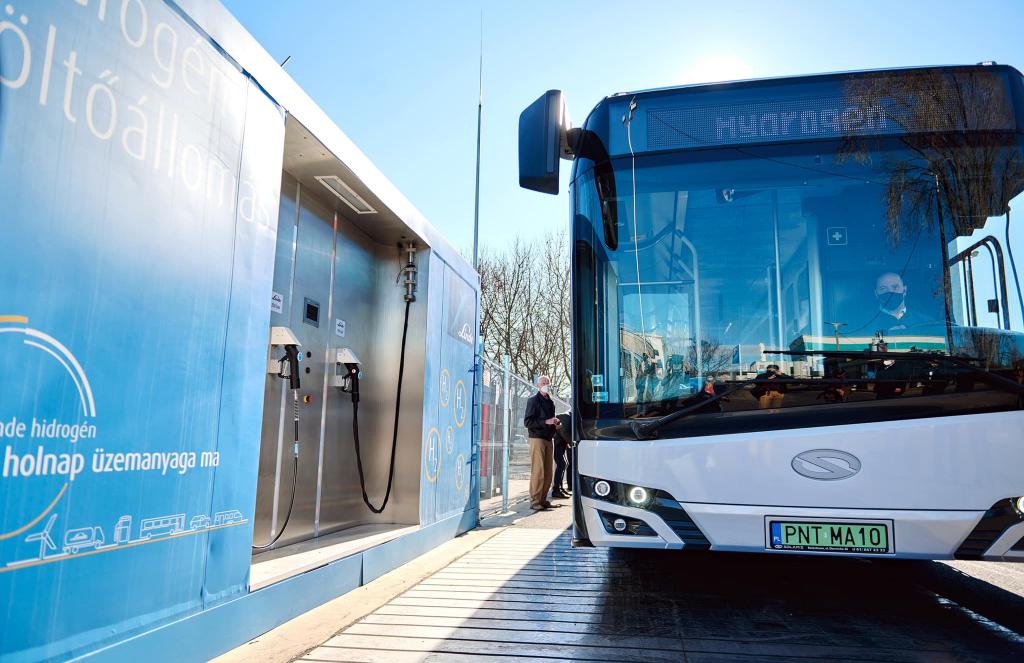Thessaloniki gets ready for its metro launch in November
The underground rapid transit lines have been under construction for almost two decades due to various project delays
 TheMayor.EU logo
TheMayor.EU logo 
Hungary is betting on hydrogen to reduce its transport emissions , Source: Attila Steiner on Facebook
It paves the way for wider adoption of hydrogen technology
Yesterday, the Hungarian State Secretary for Climate, Energy Policy and the Development of the Circular Economy, Attila Steiner, announced the launch of the first-ever hydrogen bus line in Hungary.
The line will go from Budapest to the nearby suburb of Vecsés and will run for around three weeks. Authorities will use the opportunity to gather information on the everyday usage of the hydrogen bus.
The line was created by HUMDA, the Hungarian Motorsport and Green Mobility Development Agency and it will have a single green hydrogen-powered bus, that citizens will be able to use for free. The bus will start operating on 11 February and it will run on the streets of Budapest until 6 March.
Hydrogen-powered vehicles offer a range of benefits in comparison to conventional electric options and, according to HUMDA, are quite comparable to their fossil-fueled counterparts. Despite a slight price difference, hydrogen is way less polluting than fossil fuels.
To be more precise, hydrogen can have zero emissions if it is produced with renewable sources. This is because hydrogen power cells create electricity by using electrolysis and the only exhaust product is water.
According to State Secretary Steiner, the transport sector accounts for a fifth of CO2 emissions in Hungary. This is why the government will need to implement pretty robust solutions to cut back on carbon.
This is why last June, the government adopted the National Hydrogen Strategy, aiming for more widespread adoption of the new technology. The plan calls for a fast expansion on production capacities, with 16,000 tons of carbon-free, 20,000 tons of low-carbon hydrogen and 240 megawatts of electrolysis capacity by 2030.
They also plan to start using hydrogen in traditionally fossil-fuel dependent sectors like power plants as well as in the military. In terms of vehicles, the strategy calls for the creation of 40 filling points, as well as 4.8 thousand heavier hydrogen-powered buses and trucks by 2030.

The underground rapid transit lines have been under construction for almost two decades due to various project delays

Now you can get your wine in Talence by paying directly in Bitcoin

That’s because the state has to spend money on updating the railway infrastructure rather than subsidizing the cost of the popular pass

Rethinking renewable energy sources for the urban landscape

The examples, compiled by Beyond Fossil Fuels, can inform and inspire communities and entrepreneurs that still feel trepidation at the prospect of energy transition

Now you can get your wine in Talence by paying directly in Bitcoin

The 10th European Conference on Sustainable Cities and Towns (ESCT) sets the stage for stronger cooperation between the EU, national and local level to fast track Europe's transition to climate neutrality.

At least, that’s the promise made by the mayor of Paris, Anne Hidalgo

The underground rapid transit lines have been under construction for almost two decades due to various project delays

At least, that’s the promise made by the mayor of Paris, Anne Hidalgo

Hostal de Pinós is located in the geographical centre of the autonomous region

Despite its church-y name, the district has long been known as the hangout spot for the artsy crowds

Urban dwellers across the EU are having a say in making their surroundings friendlier to people and the environment.

Forests in the EU can help green the European construction industry and bolster a continent-wide push for architectural improvements.

Apply by 10 November and do your part for the transformation of European public spaces

An interview with the Mayor of a Polish city that seeks to reinvent itself

An interview with the newly elected ICLEI President and Mayor of Malmö

A conversation with the Mayor of Lisbon about the spirit and dimensions of innovation present in the Portuguese capital














